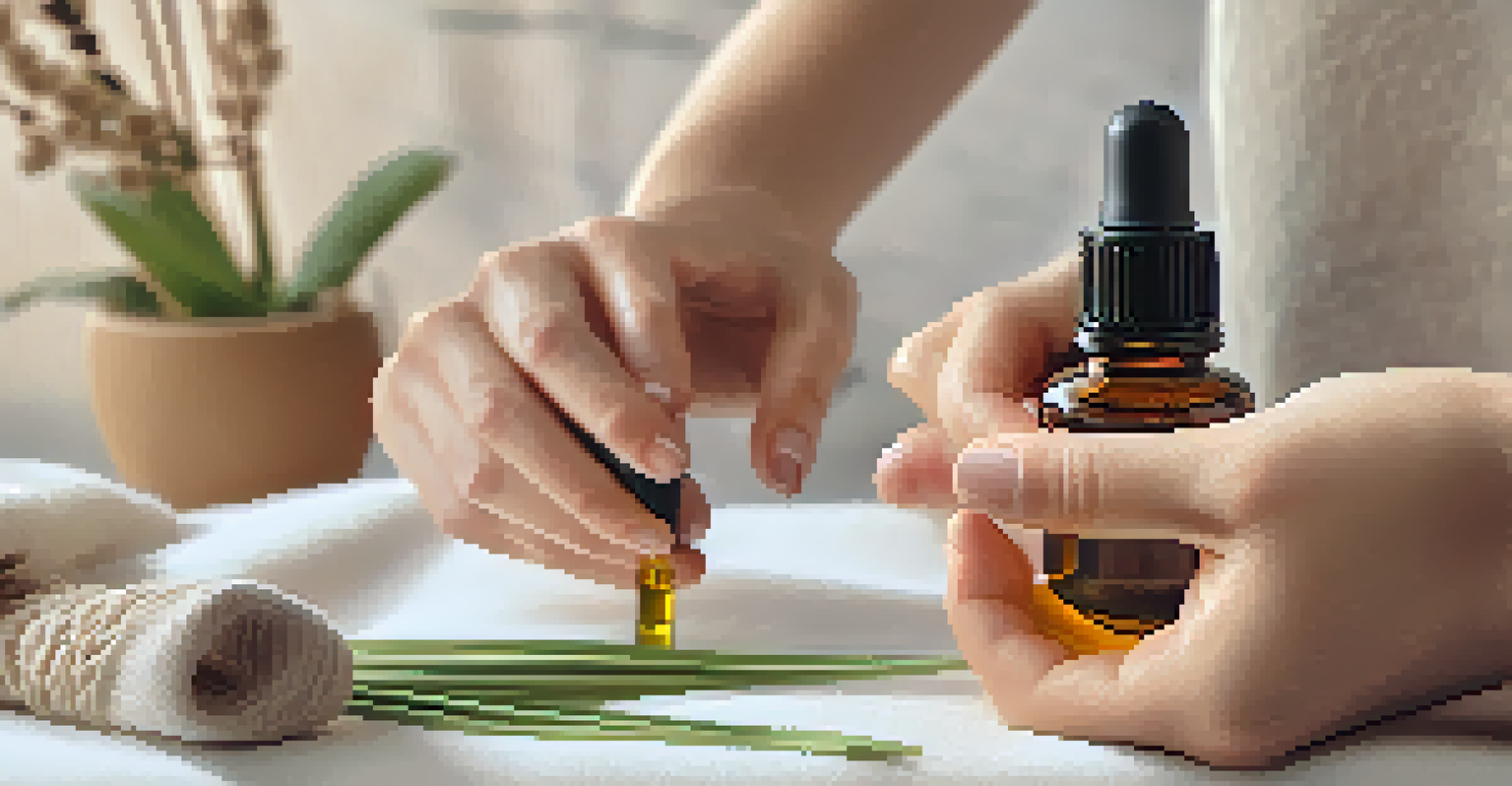Aromatherapy for Sleep: Essential Oils for Better Rest

Understanding Aromatherapy and Its Benefits for Sleep
Aromatherapy is a holistic healing treatment that uses natural plant extracts, commonly known as essential oils, to promote physical and emotional well-being. When it comes to sleep, certain essential oils can create a calming environment that signals to your body it's time to unwind. This practice has been used for centuries across various cultures, showing its lasting appeal and effectiveness.
Aromatherapy helps in relaxing the mind and body, allowing for a deeper sleep and enhancing overall well-being.
The soothing scents of essential oils can help reduce anxiety and stress, which are often the culprits behind a restless night. By incorporating these fragrant oils into your bedtime routine, you may find it easier to drift off into a peaceful slumber. It's fascinating how something so simple can have such a profound impact on our sleep quality.
Moreover, aromatherapy can enhance your sleep environment, making it a more inviting space for rest. Whether you prefer diffusers, pillow sprays, or simply inhaling the scent directly, the application methods are versatile and easy to integrate into your nightly habits.
Top Essential Oils for Promoting Better Sleep
When it comes to essential oils for sleep, lavender is often the star of the show. Renowned for its calming properties, lavender oil can help lower heart rates and reduce stress levels, making it easier to fall asleep. A few drops on your pillow or in a diffuser can transform your bedroom into a serene sanctuary.

Another excellent choice is chamomile oil, known for its gentle, soothing aroma. This oil is often associated with relaxation and can help to ease tension and anxiety, allowing your mind to settle down at the end of the day. Consider adding chamomile oil to your evening tea routine for an extra relaxation boost.
Aromatherapy Enhances Sleep Quality
Using essential oils like lavender and chamomile can create a calming environment that promotes better sleep.
For those who prefer a more earthy scent, vetiver oil is a fantastic option. Its rich, grounding aroma has been shown to have sedative effects that can help calm an overactive mind. Using vetiver in your aromatherapy practice can create a comforting ambiance that encourages a deeper, more restorative sleep.
How to Use Essential Oils for Sleep Effectively
Using essential oils for sleep can be simple and enjoyable. One of the most popular methods is through a diffuser, which disperses the oil into the air, filling the room with its calming scent. This can create a relaxing atmosphere that prepares your mind and body for rest.
The use of essential oils for relaxation is a gentle reminder that nature provides us with many tools for well-being.
Another effective approach is applying essential oils topically. Diluting the oil with a carrier oil, such as coconut or jojoba oil, allows you to massage it onto pulse points like your wrists or neck. This not only offers the benefits of aromatherapy but also adds a soothing, tactile element to your wind-down routine.
Lastly, incorporating essential oils into your bath can provide a luxurious experience before bedtime. Adding a few drops of your favorite sleep-promoting oil to warm bathwater can help ease tension and signal your body that it’s time for rest. Just imagine soaking in a fragrant bath, letting the stress of the day melt away.
Creating a Sleep-Inducing Environment with Aromatherapy
Your sleep environment plays a crucial role in the quality of your rest. To optimize it, consider incorporating aromatherapy alongside other elements like dim lighting and comfortable bedding. The goal is to create a sanctuary that invites relaxation and promotes sleep.
Using essential oils in your bedroom can help set the mood. For instance, you might use a lavender-infused pillow spray or a calming essential oil blend in a diffuser to create a peaceful atmosphere. This sensory experience can signal to your brain that it's time to unwind.
Effective Ways to Use Essential Oils
Methods such as diffusing, topical application, and adding oils to baths can help integrate aromatherapy into your bedtime routine.
Additionally, be mindful of the scents that resonate with you personally. Everyone has unique preferences, and what works for one person may not work for another. Experimenting with different oils can help you find the perfect combination that makes your space feel right for sleep.
Safety Tips for Using Essential Oils
While essential oils can be beneficial, it's essential to use them safely. Always dilute essential oils with a carrier oil before applying them to your skin, as some oils can cause irritation if used undiluted. This simple step can help you enjoy the benefits without any adverse reactions.
Also, be cautious about the types of essential oils you choose, especially if you have pets or young children. Some oils can be harmful to animals or may not be suitable for children, so it's wise to do your research beforehand. Your safety and the safety of your loved ones should always come first.
Finally, start with small amounts to see how your body reacts. Everyone's skin chemistry is different, and what works for one person may not work for another. Pay attention to how you feel after using certain oils, and if you notice any negative reactions, discontinue use immediately.
Incorporating Aromatherapy into Your Bedtime Routine
Creating a bedtime routine that includes aromatherapy can enhance your overall sleep experience. Start by setting aside a few minutes each evening to prepare your environment. This could involve dimming the lights, turning on a diffuser, and maybe even lighting a candle to foster a calming atmosphere.
Consider dedicating time to mindfulness practices like meditation or gentle stretching while surrounded by your favorite scents. This combination of physical relaxation and soothing aromas can help signal to your body that it's time to wind down. It's all about creating a transition from the hustle and bustle of the day to the peacefulness of the night.
Safety Considerations with Oils
It's crucial to dilute essential oils, research their effects on children and pets, and start with small amounts to ensure safe use.
Lastly, consistency is key. The more you incorporate these practices into your routine, the more effective they can be. Over time, your body will start to associate these scents and rituals with sleep, making it easier to drift off into a restful night.
Conclusion: Embrace Aromatherapy for Restful Sleep
Incorporating aromatherapy into your sleep routine can be a powerful way to enhance your rest. With the right essential oils, you can create a calming environment that fosters relaxation and helps alleviate stress. Remember, it’s all about finding the scents and methods that resonate with you.
As you explore the world of essential oils, don’t hesitate to experiment and see what works best for your individual needs. There's a wealth of options out there, and the journey of discovery can be just as rewarding as the results themselves. Embrace this opportunity to improve your sleep naturally.

Ultimately, a good night's sleep is essential for overall health and well-being. By integrating aromatherapy into your nightly routine, you’re taking proactive steps toward achieving the restful sleep you deserve.